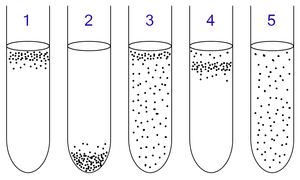A facultative anaerobe is an organism that makes ATP by aerobic respiration if oxygen is present, but is capable of switching to fermentation or anaerobic respiration if oxygen is absent. An obligate aerobe, by contrast, cannot make ATP in the absence of oxygen, and obligate anaerobes die in the presence of oxygen.
Some examples of facultatively anaerobic bacteria are Staphylococcus spp., Streptococcus spp., Escherichia coli, Listeria spp. and Shewanella oneidensis. Certain eukaryotes are also facultative anaerobes, including fungi such as Saccharomyces cerevisiae and many aquatic invertebrates such as Nereid (worm) polychaetes.
See also
 <br>
<br> - Aerobic respiration
- Anaerobic respiration
- Fermentation
- Obligate aerobe
- Obligate anaerobe
- Microaerophile
References

External links

- Facultative Anaerobic Bacteria
- Obligate Anaerobic Bacteria
- Anaerobic Bacteria and Anaerobic Bacteria in the decomposition (stabilization) of organic matter.




0 komentar :
Posting Komentar